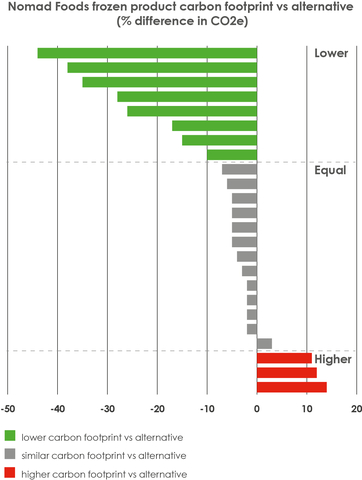Nomad Foods Urges Food Industry to Adopt End-to-End Carbon Impact Product Assessment to Help Tackle the Climate Emergency
Nomad Foods, a leader in Europe’s frozen food sector, is urging the food industry and regulators to adopt a comprehensive approach to Life Cycle Assessment (LCA) studies. This approach emphasizes food loss and waste impacts to enhance consumer transparency and drive carbon emission reductions. A recent LCA study involving 22 popular frozen products revealed that most had an equal or lower carbon footprint compared to non-frozen alternatives. The study, conducted in collaboration with PRé Sustainability, aims to encourage better environmental practices in food production.
- New LCA study shows most frozen products have equal or lower carbon footprint than non-frozen alternatives.
- Study includes comprehensive data on food waste, enhancing accuracy of carbon assessments.
- None.
Fully understanding food waste in the product life cycle is vital for reducing carbon emissions
FELTHAM,

Results for the 22 frozen products assessed under the new study showed that most had an equal or lower carbon footprint than similar products using other preservation methods (Graphic: Business Wire)
Food production is a major contributor to climate change and making better environmental choices about what we eat and how we reduce food waste is one way for businesses and consumers to lower their carbon impact. To support this action, it’s vital that food companies fully understand their products’ total emissions footprint and provide clear, accurate and complete information.
With carbon labels and previous LCA studies on food often limited in scope,
Crucially, the study went beyond the scope of existing LCAs to include all stages of the product life cycle, incorporating new data on retailer and consumer food waste (an important element of Scope 3 emissions for food manufacturers) and primary data for all processing steps, improving the accuracy of the assessment – with the results peer reviewed by leading experts.
The study showed that retail and consumer food loss and waste – data which is not generally included in previous LCA assessments of food – plays an important part of the product life cycle and has a significant effect on a product’s overall environmental impact. In fact, retail and consumer food waste equates to an estimated 160m tonnes and 17.25m tonnes of CO2 in the
This new assessment means that, for the first time ever, clear conclusions can be drawn about the carbon footprint of frozen foods products and meaningful comparisons made to their non-frozen alternatives, while accounting for all relevant and material impacts. Results for the 22 frozen products assessed under the new study showed that most had an equal or lower carbon footprint than similar products using other preservation methods.
Stéfan Descheemaeker, Chief Executive Officer,
About
About PRé Sustainability
For thirty years PRé Sustainability has been at the forefront of life cycle thinking and has built on its knowledge and experience in sustainability metrics and impact assessments to provide state of the art methods, consulting services and software tools. Internationally, leading organizations work with PRé to integrate sustainability into their product development procedures in order to create business growth and business value. PRé has an office in
Notes to Editors:
1The comprehensive LCA study covered 10 keys stages. Stages 6 – 10 are the extended scope of the assessment not generally included in other studies:
- Ingredients: Production, including transport to factory.
- Processing: All activities that happen at the factory including energy, on-site waste and the treatment of it, and activities related to packaging the product. Also includes any pre-blanching or pre-freezing before it reaches the factory. The study included primary data for all material processes improving the accuracy of the assessment.
- Packaging: Packaging materials, including their transport to the factory.
- Distribution: Transport from the factory, storage at the distribution centre, transport to the retail hub and storage at the retail hub.
- Retail storage: Electricity and coolant use in the retail cold room and on the retail floor.
- Retail waste: Waste treatment of transport packaging, product losses and waste treatment of product losses, including processing, packaging and distribution of the product losses.
- Consumer transport: From the retailer to the consumer.
- Consumer storage: Electricity use for storage at the consumer.
- Consumer preparation: Energy use at the consumer to cook the food product, as well as any capital goods.
- Consumer waste: Waste treatment of primary packaging and product losses. This includes all upstream processes required to compensate for the product losses at the consumer.
26.9m tonnes of the UK’s annual total of 9.5m tonnes of food waste is down to the retailer and consumer, equivalent to 17.25m tonnes of CO2 (WRAP). In the
View source version on businesswire.com: https://www.businesswire.com/news/home/20220509005425/en/
Nomad Foods Media Contacts:
Group Director of Corporate Affairs
sam.fulton@nomadfoods.com
+44 7936 924691
Corporate Affairs Manager
oliver.thomas@nomadfoods.com
+44 7568 108744
Source:







